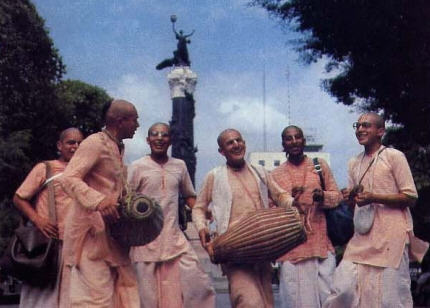Hare Krsna
Please accept my humble obeisance. All glories to Srila Prabhupada
By His Divine Grace A. C. Bhaktivedanta Swami Prabhupada
The word pāpa-yonayah means “born into a lower class.” According to the Vedic system of classification, women, vaisyas, and sudras belong to a lower social order. A low life means a life without Krishna consciousness. High and low positions in society are calculated by considering a person’s Krishna consciousness. A brāhmana is considered to be on the highest platform because he knows Brahman, the Absolute Truth. The second caste, the ksatriya caste, also know Brahman, but not as well as the brāhmanas. The vaiśyas and śūdrasdo not clearly understand God consciousness, but if they take to Krishna consciousness by the mercy of Krishna and the spiritual master, they do not remain in the lower castes (pāpa-yonayah). It is clearly stated: te ’pi yānti parām gatim.
Unless one has attained the highest standard of life, one cannot return home, back to Godhead. One may be a śūdra, vaiśya or woman, but if one is situated in the service of the Lord in Krishna consciousness, one should not be consideredstrī, śūdra, vaiśya or lower than śūdra. Though a person may be from a lowborn family, if he is engaged in the Lord’s service he should never be considered to belong to a lowborn family. The Padma Purāna forbids, vīksate jāti-sāmānyāt sa yāti narakam-dhruvam. A person goes to hell quickly when he considers a devotee of the Lord in terms of birth. Although Śrī Rāmānanda Rāya supposedly took birth in a śūdra family, he is not to be considered a śūdra, for he was a great advanced devotee. Indeed, he was on the transcendental platform. Śrī Caitanya Mahāprabhu therefore embraced him. Out of spiritual humility, Śrī Rāmānanda Rāya presented himself as a śūdra (rāja-sevī visayī śūdrādhama). Even though one may engage in government service or in any other pounds-shillings-pence business—in short, in materialistic life-he need only take to Krishna consciousness. Krishna consciousness is a very simple process. One need only chant the holy names of the Lord and strictly follow the principles forbidding sinful activity. In this way one can no longer be considered an untouchable, avisayī or a śūdra. One who is advanced in spiritual life should not associate with nondevotees—namely men in government service and men engaged in materialistic activity for sense gratification or in the service of others. Such men are considered visayī, materialistic. It is said:
niskincanasya bhagavad-bhajanonmukhasyapāram param jigamisor bhava-sāgarasyasandarśanam visayinām atha yositām cahā hanta hanta visa-bhaksanato ’py asādhu [Cc. Madhya 11.8]“A person who is very seriously engaged in cultivating devotional service with a view to crossing the ocean of nescience and who has completely abandoned all material activities should never see a śūdra, a vaiśya or a woman.” (Śrī Caitanya-candrodaya-nātaka 8.23)
[The Bhaktivedanta Purport to the Chaitanya Charitamrita Madhya 11.8]

Comments